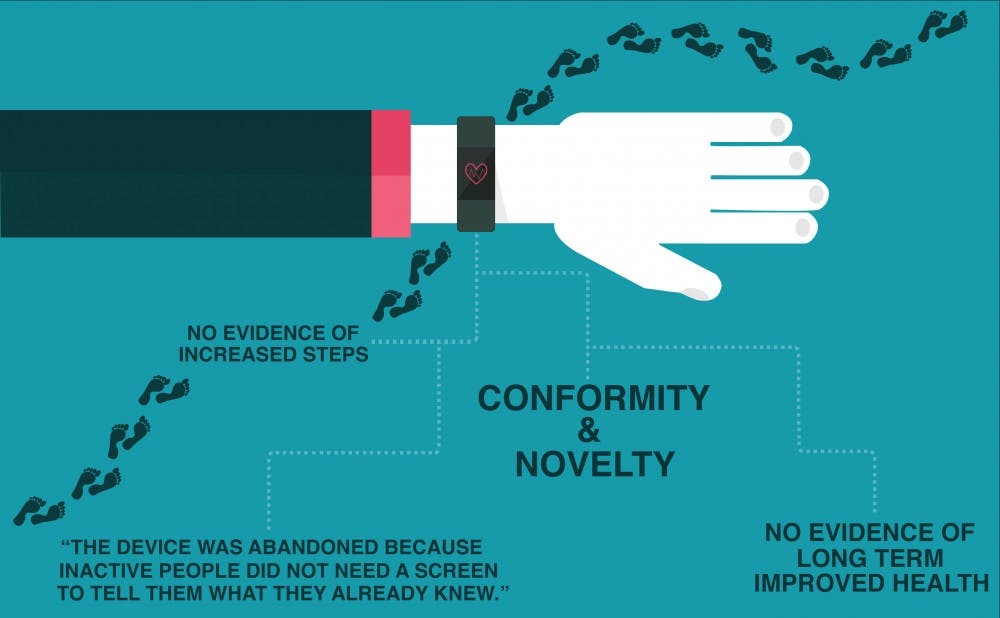Sad news for anyone who bought a fitness tracker during the summer—recent research suggests such devices do not help improve health.
A recent study led by Eric Finkelstein, a professor of health services and systems research at Duke-National University of Singapore Medical School, shows that the recent, pricey fitness trend does not actually achieve its stated purpose. Although people expect fitness trackers to increase their activity and improve long-term health, Finkelstein’s study—one of the largest randomized trials of its kind—found no evidence of increased steps walked in the short term or improved health effects in the long term.
From 2013 to 2014, Finkelstein and his Singapore research team conducted a study of 800 full-time workers from 13 different Singapore employers. Participants were given a Fitbit Zip and a clip-on fitness tracker, and randomly assigned to one of four groups receiving a different form of incentive: a Fitbit, a Fitbit and a cash reward, a Fitbit and charity-based incentives or a control group with no Fitbit or incentive.
Individuals participating in the two monetary incentive groups earned up to $11 in U.S. currency for logging 50,000 to 70,000 steps a week and could double their earnings if they exceeded that goal. Those in the cash reward group earned money for themselves, while those in the charity reward group raised money for the charity of their choice. Participants in the Fitbit-only and control groups were given small weekly cash payouts regardless of how many steps they logged to keep them interested in the study.
Researchers measured activity level as well as health outcomes such as weight, blood pressure and quality of life. After six months, the cash group was more active than the control group and was the only group who increased their number of steps taken. Although 88 percent of the cash group still used the Fitbit after six months, only 62 percent of the Fitbit-only group and the group receiving a charity-based incentive did so as well.
“The device was abandoned because inactive people did not need a screen to tell them what they already knew,” Finkelstein said.
Once incentives were discontinued for all groups, only ten percent of workers continued using the device. By the end of the year, the incentive group’s step measurements were actually a bit worse than when they had started.
“Participants dropped below their baseline measurements not only because sustained long-term goal pursuit is difficult but also because many individuals had bought Fitbits simply because their friends had one," said Michelle vanDellen, who earned her Ph.D. from Duke in 2008 and is head of the Behavior and Motivation Lab at the University of Georgia. "People who buy Fitbits as an act of conformity are not truly motivated to improve their health.”
The Fitbit trend developed for two reasons, vanDellen said. First, Fitbits allow people to monitor their progress toward goals in a concrete way; second, they provide social motivation in terms of comparing and sharing their results with the community.
However, Finkelstein said he believes there is a general misunderstanding about what these trackers can do.
“People wrongly buy Fitbits thinking they will help improve their health… but buying a tracker is the equivalent of buying a scale," Finkelstein said. "People who want to lose weight are told to join a program, not to buy a scale. Why would we tell people who want to lose weight to buy a tracker?”
Although Fitbits may not have an effect for many users, they may help in specific instances, Murali Doraiswamy, professor of psychiatry and medicine at Duke University Health System, wrote in an email.
"Clearly it also helped many people begin exercise and get to know their baseline activity level," Doraiswamy wrote. "Trackers do help athletes and fitness lovers get to the next level."
He added that he thought Fitbits took off in popularity due to fashion trends.
Despite the findings of Finkelstein's study, Fitbit Inc. stated in a CBS news article that “numerous published studies, along with internal Fitbit data, continue to demonstrate the health benefits of using a fitness tracker combined with a mobile app to support health and fitness goals.”
vanDellen, a current Fitbit user, believes that subtle changes and upgrades in the latest Fitbits better integrate technology with other features necessary to lose weight.
Additionally, Finkelstein said he sees potential in newer Fitbits to move away from simply tracking performance to adding interventions that address behavior, education and motivation. Still, Finkelstein’s study provides evidence that Fitbits in their current iteration do not create long-term behavioral change.
"I think it's a new technology, but it's a novelty that will wear off quickly," he said.
Get The Chronicle straight to your inbox
Signup for our weekly newsletter. Cancel at any time.

